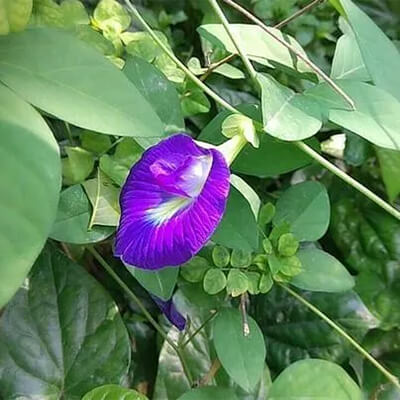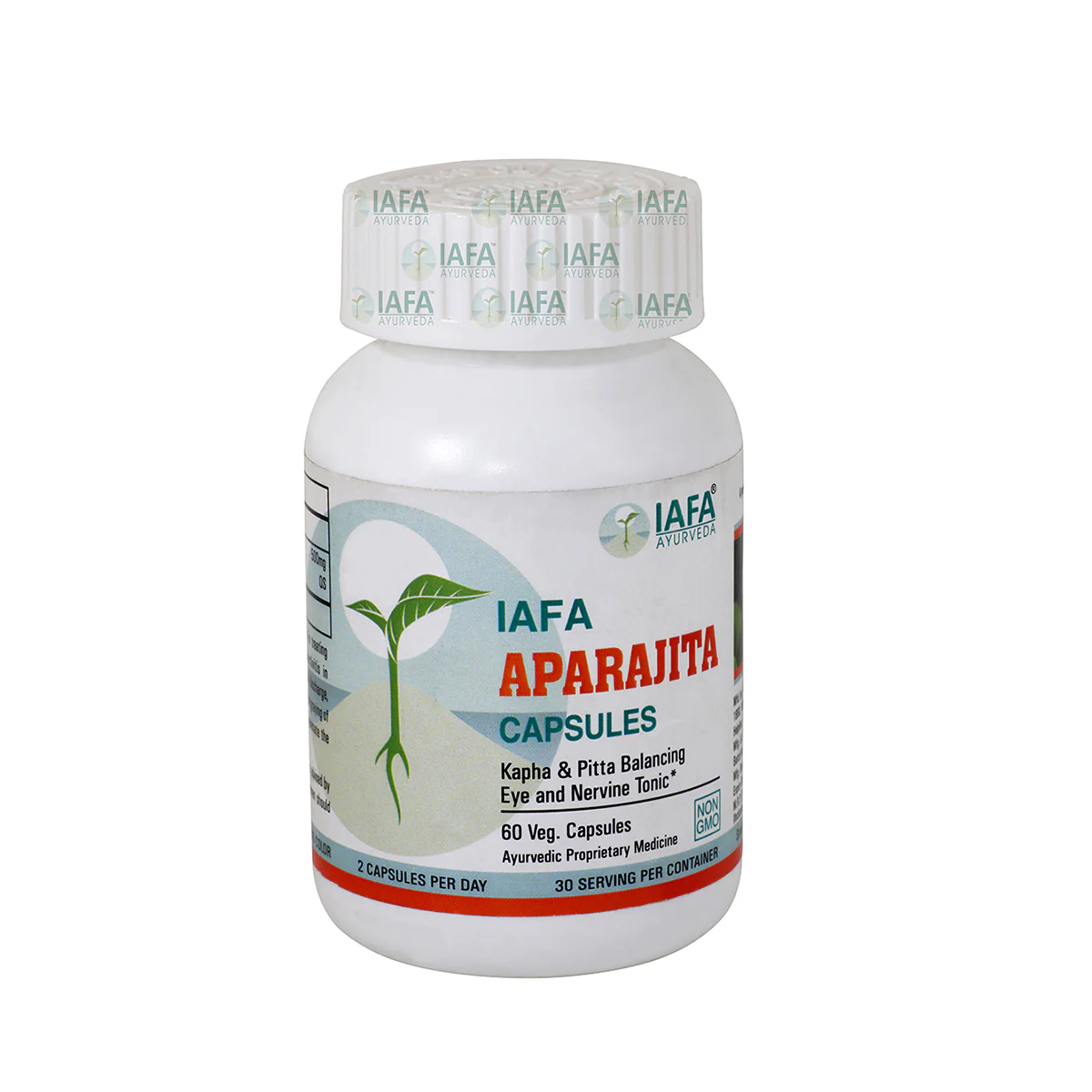On This Page
Aparajita – The Memory Enhancing and Anxiolytic Agent
Introduction
Aparajita botanically known as Clitoria ternatea is a plant belonging to the Fabaceae family which acts as excellent memory enhancing, anxiolytic, antistress, nootropic, sedative, tranquilizing agent, etc. Aparajita is a plant of warm climate conditions and is used as an ornamental plant due to its attractive blue color flower. Aparajita consists of various secondary metabolites like triterpenoids, anthocyanin, glycosides, steroids, etc due to which it exhibits anti-microbial, anti-inflammatory, anti-diabetic, muscle relaxing, diuretic, analgesic properties, etc. It is commonly known as butterfly pea and has been used in the ayurvedic system of medicines for centuries. It is one of the various medicinal plants that are used in the treatment of poisoning. As per Ayurvedic text, Aparajita is Tikata (bitter) and Kashaya (astringent) in taste and exhibits Sheeta Virya i.e cold potency. In BhavaPrakasha Nighantu, Aparajita is of two types Shweta Pushpa and Neela Pushpa Aparajita. Bhava Prakasha Nighantu and Kaiydeva Nighantu both mentioned Aparajita as Vishapaha (anti-poisonous drug). It is a controversial drug, as some scholars of South India consider Aparajita as the source for Shankhpushpi.
Basonym of Aparajita
ना पराजिता इति |
Aparajita (Clitoria ternatea) is an efficacious drug and it can’t be defeated by diseases.
Synonyms of Agastya
- According to morphology
गिरिकर्णिका- गिरी बाल मुषिकाया: कर्ण इव पर्णम अस्या: |
The leaves of Aparajita resemble the ears of a small rat.
आस्फोटा- आ समन्तात स्फोटयति इति |
Aparajita spreads in all directions or fruits are dehiscent.
- Other synonyms
विष्णु क्रान्ता – विष्णुना अक्रान्ता इति |
Aparajita is considered a sacred plant and it is regarded as a plant related to Lord Vishnu.
Other synonyms of Aparajita are:
- Sveta
- Maha Sveta
- Sephanda
Regional names of Aparajita
- Butterfly pea, winged leaves Clitoria (English)
- Aparajita, Koyala, Vishnukranta (Hindi)
- Shankhpushpa (Kannada)
- Shankhapushpam (Malayalam)
- Gokurna, Gokarni, Kajali (Marathi)
- Dintena (Telugu)
- Garani (Gujrati)
- Blue ternate
- Shankupushpam
- Asian pigeonwings
Botanical Name
Clitoria ternatea Linn.
The Clitoria word is given because its flower resembles the clitoris.
Ternatea word is derived from the island of ternate.
Grandiflora word is derived from the word grandi means big and flora means flowers.
Family:- Fabaceae / Papilionaceae (Aprajita Kula)
Ayurveda reference for Aparajita (Clitoria ternatea Linn.)
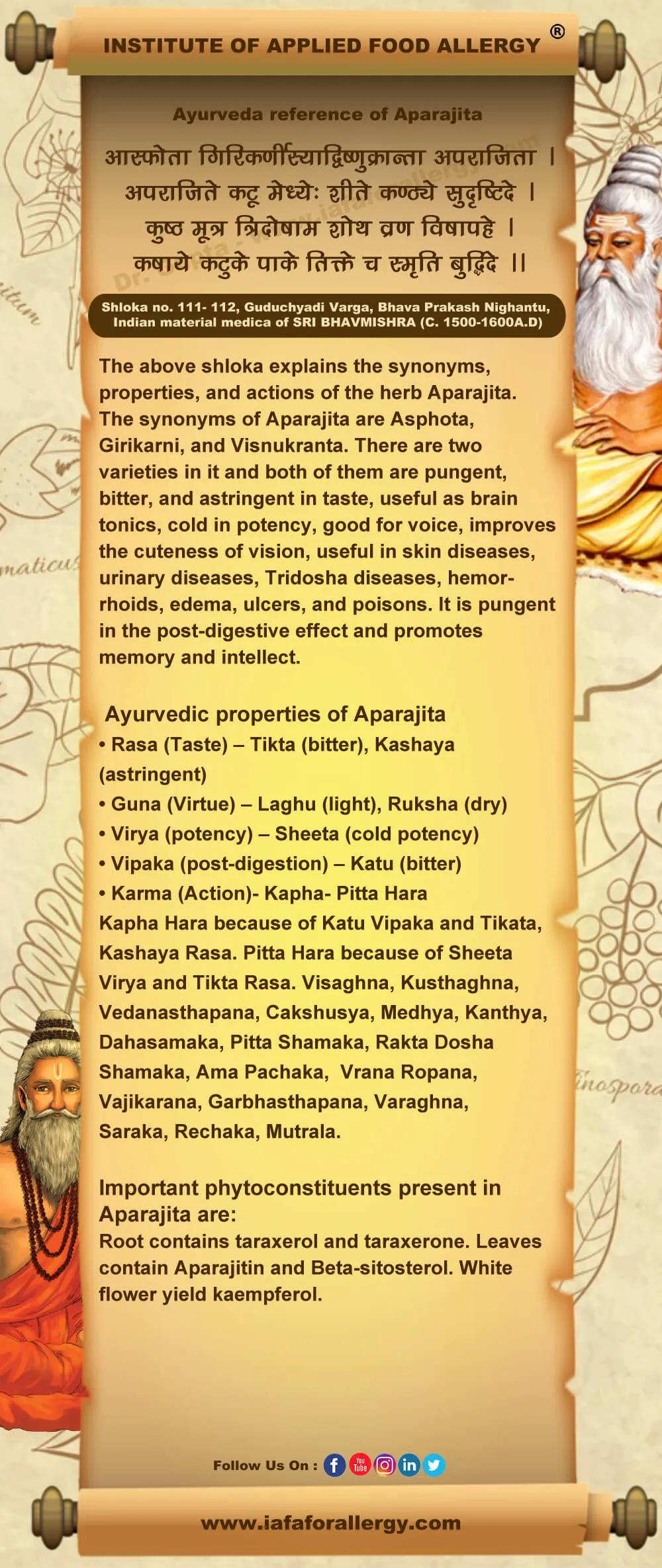
Scientific classification of Aparajita
| Kingdom | Plantae |
| Class | Dicotyledons |
| Subclass | Polypetalae |
| Series | Calyciflorae |
| Order | Rosales |
| Family | Fabaceae (Papilionaceae) |
| Genus | Clitoria |
| Species | ternatea |
Classification of Aparajita as per Charaka and Sushruta
- Charaka: Shirovirechnopaga Mahakashaya.
- Sushruta: Not mentioned in Varga.
Aparajita’s description in Brihtrayi as synonym Girikarnika (Controversy)
This has been identified with Clitoria ternatea Linn. which may better be recognized as Sankhini. The popular names of this Clitoria such as Gokarna or Garani together with partial similarity in its medicinal properties attributed to Girikarnika may have been responsible for the above opinion. It may, however, be noted that the Shirovirechaka action of Girikarnika and the purgative one of Clitoria emphasized in the literature help to differentiate between them. What, then, can be Girikarnika?
The equivalent popular name Svetasyanda given by Dalhana for Shveta Girikarnika may also indicate its Shirovirechana action. Attention may be drawn to a plant known as Badichang, Chanakhi, and Dagana and used by the tribal people, especially as an antidote to snake poison. It has been identified with Symphorema polyandrous Wight. Its small white flowers about half a dozen in number are seated on a flattened torus which is surrounded by a pseudo whorl of grey involucre leaves and which may be likened to Karnika of lotus and rose and also be used by ladies to decorate their ears. The leaves are hairy and give a distant appearance of Sephalika (Nyctanthes ) leaves. The fruits are nearly similar in shape and size to imported Renuka fruits wrongly called seeds and when blown in powder form into the nostrils cause profuse flow (Vaisravana) of nasal secretion. Discussion about the identities of Renuka or Farenuka, Sveta and Sindhu- Vara, may be consulted for further light on this plant, which may be used as Girikarnika.
Charaka Samhita: C. S. Chi. 23/ 194
Sushruta Samhita: S. S. Su. 39/ 6, S. S. Chi. 8/ 39, S. S. Chi. 11/ 9, S. S. U. 59/ 17, S. S. U. 61/ 32
Vaghbhata: A. H. U. 36/ 57, 60
Aparajita’s description in Brihtrayi as synonym Ashvakhura (Controversy)
This has been mentioned only once in the Amrita Ghrita of C. S. Ci. 23/ 241-247 and once in A. H. U. 3/ 48. It appears that it has two varieties out of which the white (Shweta) variety has been used in the preparation of Amrita Ghrita. The Nighantus appear to identify it with Aparajita (Clitoria ternatea Linn.) i.e Raja Nighantu mentioned it as a variety of Aparajita. But it is not clear why this name should at all be given to Clitoria. Asvakhuraka appears to indicate a close similarity in the appearance of the hoof of a horse and the plant or a part of it which has been given this name. It is, therefore, reasonable to believe that when the real drug plant became unavailable, another drug of similar properties (Visaghna and useful in mental troubles) was substituted and began to be used under the original name. The real Avakhuraka has, therefore, to be searched for. In this connection, attention may be drawn to a plant known as Ghodatapa among the tribal people of the Pancamadhi (M. P.) area. It is a fern, the leaf bases of which exactly resemble the hoof of a horse in appearance, and it is used by the local people. It is still under investigation.
Charaka Samhita: C. S. Chi. 23/ 244
Vaghbhata: A. H. U. 3/ 48
- Charaka Samhita: C. S. Su. 13/ 9, C. S. Su. 27/ 154, C. S. Chi. 29/ 64
- Sushruta Samhita: S. S. Su. 46/ 187, 188
- Vagbhata: A. H. Su. 6/ 120
Aparajita’s description in Brihtrayi as synonym Asphota (Controversy)
The references include those for Asphot and Asphota Tender as well. Asphot and Asphota are usually considered to be Sariva and Arka respectively but according to the commentators, Girikarnika and Hapharamli are also taken. Girikarnika, although at present believed to be Clitoria ternatea Linn., is not satisfactorily identified and Hapharamali is Vallaris solanacea O. Ktze. which according to some is also considered to be Sveta Sariva. It should be noted that in many Yogas, Asphota occurs with either Arka or Sariva or even both. It thus indicates that Asphota may be altogether different from Sariva and Arka. It may, therefore, be suggested to accept Vallaris as genuine Asphota, and Arka and Sariva may be treated as its substitutes.
Charaka Samhita: C. S. Chi. 3/ 267, C. S. Chi. 7/ 111, C. S. Chi. 17/ 109, C. S. Chi. 23/ 241, C. S. Chi. 28/ 125
Sushruta Samhita: S. S. Su. 11/ 11, S. S. Chi. 6/ 13, S. S. Chi. 9/ 54, S. S. Chi. 18/ 39, S. S. Ka. 7/ 40, S. S. U. 11/ 5, 11, S. S. U. 32/ 3, S. S. U. 39/ 252
Vaghbhata: A. H. Su. 30/ 9, A. H. Chi. 8/ 49, A. H. Chi. 10/ 42, A. H. Chi. 19/ 79, A. H. Chi. 38/ 26
Aparajita’s description in Brihtrayi as Shankhapushpi (Controversy)
This drug, a well-known nervine tonic, is also a subject of controversy. Clitoria ternatea Linn. has been accepted as Shankhapuspi by most of the South Indian Vaidyas while this is believed to be Canscora decussata Schult by the majority of the Bengal Kavirajas. These two plants may be treated as Sankhini and Yavatikta respectively and may serve as partial substitutes of Sankhapuspi due to their reported action as nervine tonics. Evolvulus alsinoides Linn. bearing blue flowers may be treated as Vishnukranta which is usually believed to be a variety of Shankhapuspi.
Charaka Samhita: C. S. Chi. 1.1/ 46, 56, C. S. Chi. 1.3/ 23, 29, 30, C. S. Chi. 10/ 23, 60, C. S. Chi. 18/ 56, C. S. Chi. 21/ 61
Sushruta Samhita: S. S. Su. 42/ 18, S. S. Sa. 10/ 68, S. S. Chi. 30/ 24, S. S. U. 52/ 42
Vaghbhata: A. H. Chi. 3/ 127, A. H. U. 1/ 9, 43, A. H. U. 6/ 24, A. H. U. 7/ 24, A. H. U. 39/ 18, 44, 45, 50
Aparajita’s description in Brihtrayi as Sveta or in Sveta Dwaya (Controversy)
Sveta has been used for two drug plants which have been named Kshudra Sveta and Maha Sveta. Dalhana at one place identifies the Kshudra variety with white-flowered Sephanda and Mahasveta variety as the blue-flowered Sephanda. Chakra, on the other hand, recognizes the first variety as Sveta Aparajita and the second as another variety of Aparajit or Katabhi. Aparajita of Cakra and Sephanda of Dalhana appear to be the same and could be identified as Kshudra Sveta. As regards Maha Sveta, Chakra has alternatively suggested another plant called Katabhi which is identified as Sveta Sirisha (Albizia procera Benth.). This being a tree species could very well be called Mahasveta. If Aparajita and Sephanda of the commentators are Clitoria ternatea Linn. this could be the Kshudra Sveta but it is accepted as Shankhini. The Shirovirechaka properties of the Sveta varieties combined with their action on the brain and in poisoning draw attention towards other herbaceous or shrubby plant species such as Sveta Vacha, Svera Durva, white-flowered Vitex negundo Linn. or Symphorema (which we have identified with Girikarnika). Sveta Vacha or even ordinary Vacha (Acorus) may be tentatively accepted as Kshudra Sveta.
Charaka Samhita: C. S. Su. 1/ 78, C. S. Su. 2/ 3, C. S. Su. 4/ 27, 50, C. S. Su. 5/ 23, c. s. Vi. 8/ 158, C. S. Chi. 3/ 266, C. S. Chi. 9/ 75, 79, C. S. Chi. 10/ 40, C. S. Chi. 23/ 69, 78, 99, 194, 212
Sushruta Samhita: S. S. Su. 39/ 3, S. S. Chi. 22/ 63, S. S. Sa. 10/ 69, S. S. Ka. 1/ 54, 65, S. S. Ka. 5/ 75, 76, S. S. Ka. 6/ 12, 19, S. S. Ka. 7/ 24, 52, S. S. U. 24/ 32
Vagbhata: A. H. Su. 15/ 28, A. H. Su. 21/ 18, A. H. U. 22/ 63, A. H. U. 34/ 2, A. H. U 35/ 46, A. H. U. 36/ 61, A. H. U. 38/ 37.
The historical background of Aparajita
Aparajita is delineated in Atharvaveda wherein properties like Raksoghna, Krtyad-Ushana, Yasasya, and Varchasya are attributed to it. It is also considered Visahara. However, in Brihattrayi texts, we do not come across the term Aparajita. Aparajita is however found in one context in Susruta Uttara tantra. Charaka quoted Sveta and Maha Sveta under Sirovirechanopaga groups which are considered to be Sveta Aparajita and Katabhi respectively by Chakrapani. Under the Vayahsthapana group, Sveta is mentioned again but it is identified as Sreyasi (a variety of Rasna) by Chakrapani. Dalhana at one place identifies Kshudra Sveta with white-flowered Sephanda. Therefore, Kudra Sveta of Charaka and Sephanda of Dalhana appear to be Aparajita. As regards Maha Sveta, it may be Katabhi or Sveta Sirisha (Albizia procera Benth). Kshudra Sveta is botanically identified as Clitoria ternatea Linn.
Varieties of Aparajita
Bhava Prakasha Nighantu has mentioned two varieties of Aparajita i.e.
- Shweta Pushpa Aparajita
- Nila Pushpa Aparajita
Raja Nighantu has also mentioned two varieties of Aparajita i.e
- Aswaksura
- Nila Aparajita
Dhanwantri Nighantu has mentioned two varieties of Aparajita i.e.
- Sveta: One with a white flower
- Nila: One with a blue flower
External morphology of Clitoria ternatea Linn.
- Habit: Aparajita is a perennial twining herb.
- Stems: Stems of Aparajita are terete, pubescent.
- Leaves: Leaves of Aparajita are imparipinnate, petioles 2- 2.5 cm. long. Stipules 4 mm. long, linear, acute. Leaflets 5-7, sub coriaceous, 2.5- 5 by 2- 4.2 cm., elliptic-oblong, obtuse, glabrous or with a few short appressed hairs, base obtuse or acute, stipels filiform.
- Flowers: Flowers of Aparajita are axillary, solitary, pedicels 8-13 mm. long bracts small, linear bracteoles 6-13 mm. long, roundish, obtuse, Calyx 1.3-2 cm. long, teeth lanceolate, shorter than the tube. Corolla 3.8-5 cm. long; standard bright blue or sometimes white, with an orange center.
- Pods: Pods are 5- 10 cm. by 8- 13 mm., flattened, nearly straight, sharply beaked, sparsely appressed hairy.
- Seeds: 6-10, yellowish-brown, smooth.
Flowering and fruiting time
Rainy, Autumn to winter season; Monsoon September – January months.
Distribution of Aparajita
The plant is found common in India and Pakistan. It is cosmopolitan in the tropics. Herb occurs as a pretty climber with beautiful flowers in various provinces of the country e.g. Uttar Pradesh, Andhra Pradesh, Assam, Bihar, Madhya Pradesh, Karnataka, Tamil Nadu, Jammu and Kashmir, West Bengal, Gujarat, and other regions. Cultivated as an ornamental in the gardens and wall, gate, or porch climber.
The useful part of Aparajita
Mula (root), Beeja (seed).
Important phytoconstituent of Aparajita
Root contains taraxerol and taraxerone. Leaves contain Aparajitin and Beta-sitosterol. White flowers yield kaempferol.
Recent research on Aparajita
- A study was conducted to evaluate and elucidate the possible mechanism underlying the antinociceptive action of methanolic extracts of Clitoria ternatea leaf and root. Both root and leaf extracts of Clitoria ternatea markedly demonstrated antinociceptive action in experimental animals. Results of the formalin test showed that the antinociceptive activity of the ex- tracts may be mediated at both central and peripheral levels. Kamilla L, Ramanathan S, Sasidharanas, Mansor SM. Evaluation of the antinociceptive effect of Methanolic leaf and root extracts of Clitoria ternatea Linn. in rats. Indian J. Pharmacol. 2014 Sep-Oct; 46 (5): 515-20.
- Antidepressant activity
- Anticonvulsant activity
- Sedative agent
- Anxiolytic agent
- Anti-inflammatory activity
- Hypolipidemic activity
- Anti-cancer activity
- Analgesic activity
- Antioxidant
- Diuretic
Rasa Panchaka of Aparajita
| Rasa (Taste) | Tikta (Bitter), Kashaya (Astringent) |
| Guna (Virtue) | Laghu (light), Ruksha (dry) |
| Virya (potency) | Sheeta (cold potency) |
| Vipaka (post-digestion) | Katu (pungent) |
Dosha Karma of Aparajita
Kapha – Pitta Shamaka
Kapha Hara because of Katu Vipaka and Tikata Rasa, Kashaya Rasa.
Pitta Hara because of Sheeta Virya and Tikta Rasa, Kashaya Rasa.
Karma (Actions) of Aparajita
Visaghna, Kusthaghna, Vedanasthapana, Cakshusya, Medhya, Kanthya, Dahasamaka, Pitta Shamaka, Rakta Dosha Shamaka, Ama Pachaka, Vrana Ropana, Vajikarana, Garbha Sthapana, Varaghna,, Saraka, Rechaka, Mutrala.
Prayogarha Vyadhi (Therapeutic indication) of Aparajita
- Visa
- Sarpavisa
- Netra Roga
- Kantha Roga
- Jvara
- Daha
- Chardi
- Atisara
- Ama Dosha
- Udara Roga
- Parinama Sula
- Raktapitta
- Raktadosa
- Pittavikara
- Sotha
- Shleepada
- Valmiki
- Sukradosa
- Klaibya
- Kustha
- Svitra
- Vrana
- Apachi
- Galaganda
- Granthi
- Samrti Vikara
- Buddhi Vikara
- Medha Vikara
- Manasika Dosha
- Balrog
- Bhutonmada
- Stri Roga- Garbhasrava
- Mutravikara
- Kasa
- Shvasa
- Koshta Shuddhi
- Vibandha
Aamyik Paryog (Therapeutic uses) of Aparajita
Shotha (edema): Intake of the paste of Aparajita (Giirikarnika) destroys edema. (Vanga Sena Sotha. 91)
Mansika Vyadhi (Psychological disorder): Root of white-flowered Aparajita (Girikarnika) pounded with rice-water and mixed with ghee is used as snuff. It alleviates mental disorders. Similarly the juice of Agastya flower with black pepper (Maricha). (Raja Amrittanda. 28. 2, Chakradutta. 20. 50)
Galganda (Goiter): One suffering from goiter should use the pounded root of the white-flowered Aparajita with ghee in the morning keeping on a controlled diet. (Vanga Sena Galaganda, 20, Bhava Prakasha Chikitsa Sthana. 44. 30)
Gandamala (Cervical lymphadenopathy): Taken in the above manner, it also alleviates Gandamala. (Gada Nigreha. 4. 1. 43, Chakra Dutta. 41/ 21)
Apachi (Scrofula): The root of the white Aparajita (Girikarnika) is collected in the Pushya constellation (Nakshatra) and worn on the neck or used with cow ghee. Thus, it destroys even severe scrofula. (Raja Amrittanda. 5. 31)
Shwitra (Vitiligo): The root of white Aparajita is pounded with cold water and applied thickly on the spot affected by vitiligo which disappears in a fortnight or a month if chronic. (Raja Amrittanda. 8. 8)
Sarpa Visha (Snake-poisoning): In the snake-poisoning root of Sindhuvara and white Aparajita (Girikarnika) should be taken. (Charaka Samhita Chikitsathana. 23/ 195)
Danta Shoola (Toothache): Aparajita root with Marica kept in mouth removes pain. (Vaidya Manorma. 16/ 77)
Netra Vikara (Eye disease):
Roots of white Girikarnika (Aparajita) and Punarnava are pounded, mixed with barley powder, and dissolved in water. It is instilled in eyes to destroy corneal opacity. (Raja Amrittanda. 3/ 13)
The flowers of Aparajita are pounded with cow milk and applied to the eyes. It alleviates conjunctivitis in children. (Vaidya Manorma. 16/ 11)
Vajikarana (Aphrodisiac): The man should take leaves of white Aparajita cooked with milk in the morning. It acts as an aphrodisiac. (Vaidya Manorma. 20/ 20)
Shleepada (Filaria): Root is pounded and applied externally. It is useful in filaria and Valmiki. (Harita Samhita. 3. 36. 6).
Benefits of Aparajita
- The root is purgative and diuretic and useful in ascites. Roots are laxative and diuretic and used in fevers and ascites.
- The root juice is given in cold milk to remove phlegm in chronic bronchitis.
- The juice of the roots (white-flowered variety) is blown up (snuff or Nasya) in the nostrils as a remedy for hemicrania.
- The roots bark is diuretic and laxative, and its decoction is used as a demulcent in the irritation of the bladder and urethra.
- The seeds are cathartic, and the roots are diuretic. The powdered seeds in combination with ginger powder are used for laxative action (which may follow with gripping in some cases). The seeds are purgative and aperient.
- An infusion of the leaves mixed with common salt is applied warm all around the ear in earache, especially when accompanied by swelling of the adjoining glands.
- The juice of the leaves with ginger is administered in cases of colliquative sweating in hectic fever.
- The roots, stem, and flowers are recommended for the treatment of snake bites and scorpion- stings.
- An infusion of the leaves is externally used for washing the ulcers. An alcoholic extract of roots, in the dose of 5 to 10 grains, is useful in ascites and enlargement of the abdominal viscera. The powder of dry root is given in doses of 10 to 30 grains, and its infusion is used in gonorrhea and irritation of genitals, and urinary bladder, used in urinary troubles.
- Seeds are powdered and useful in children suffering from colic and constipation and other abdominal troubles.
- The roots are in water and used in cases of snake bites.
- In edema, the roots are powdered and given to patients. In elephantiasis, the roots are pasted and topically applied. The leaves of the plant (white-flowered variety) are boiled in milk and orally given in the morning as a sexual tonic in impotency and sexual abnormalities.
- The flowers of the plant (white variety) are made in a paste in cold water and applied to leukoderma lesions. In children with teething troubles, the flowers mixed with milk are pasted for curing eye complaints (specially Kukunaka). In adults and other common eye diseases especially in corneal opacity, the roots are rubbed in water and used as a collyrium in the eyes.
- The root powder with sugar is orally given (with Sita) and adopted in a milk diet, in hemorrhage cases (Urdhvaga Raktapitta). In the stomach and gastric pain and other troubles (e.g., Parinamasula), the roots along with sugar and honey (Sita and Madhu) are prescribed.
- The roots are used in spleen and liver enlargement, and in whooping cough. The plant is useful in mental disorders, cough, asthma, biliousness, worms, tuberculosis, burning sensation, vertigo, diarrhea, and throat affections.
Effect of Aparajita on different systems of bodies
- Respiratory system: The juice of roots along with milk is an expectorant. The root powder is given orally in cervical lymphadenitis.
- Digestive system: Seed and root are used in ascites. Seeds are laxatives. Shunthi (zingiber) is given to reduce griping pain.
- Urinary system: The seeds are diuretic; the root decoction reduces the burning of the urinary tract. It increases the volume of urine.
- Reproductive system: Aparajita root is used in spermatorrhoea. The decoction of roots is also used in the burning of the vagina.
- Circulatory system: The juice of leaves of Aparajita along with juice of zingiber reduce perspiration.
Matra (Therapeutic administration and dosage) of Aparajita
- Churna (powder): 1 – 3 grams

Have A Health Issue?
Consult Online
- Dr. Sahil Gupta (B.A.M.S., M.H.A.)
Ayurvedic Allergy Specialist
CEO & Founder of IAFA®
Classical reference of Aparajita
Bhava Prakasha Nighantu Guduchyadi Varga- 111
Synonyms
आस्फोता गिरिकर्णीस्याद्विष्णुक्रान्ता अपराजिता |
Bhava Prakasha Nighantu Guduchyadi Varga, 111- 112
Properties and action
अपराजिते कटू मेध्ये: शीते कण्ठ्ये सुदृष्टिदे |
कुष्ठ मूत्र त्रिदोषाम शोथ व्रण विषापहे |
कषाये कटुके पाके तिक्ते च स्मृति बुद्धिदे ||
Kaiydeva Nighantu Aushadi Varga, 1080
गिरिकर्णी हिमा तिक्ता, ग्रहघ्नी कण्ठदृष्टिदा |
त्रिदोषशूल कुष्ठाम व्रण शोफ विषापहा ||
Dhanwantri Nighantu Karveeradi Varga, 83- 84
गिरिकर्णी द्वय तिक्तं पित्तोपद्रवनाशनम |
चक्षुष्य विषदोषष्नं त्रिदोष शमने च तत् ||
Raja Nighantu Karveeradi Varga, 89
अश्वक्षुरा- गिरिकर्णी हिमा तिक्ता पित्तोपद्रवनाशिनी |
चक्षुष्या विषदोषघ्नी त्रिदोष शमनी च सा ||
Raja Nighantu Karveeradi Varga, 91
नील अपराजिता
नीलाद्रि कर्णी शिशिरा सतिक्ता रक्तातिसार ज्वर दाह हन्त्री |
विच्छर्दिकोन्माद भ्रमार्तिश्वासातिकासा मयहरिणी च ||
Priya Nighantu, Pipplyadi Varga, 53
गिरिकर्णी द्व्यम तिक्तं कटु शीत विषापहम् |
मेध्यं कण्ठयञ्च चक्षुष्यां शूलध्नमाम पाचनम् ||
दक्षिणे भिषजस्त्वेतां शंखपुष्पी प्रचक्षते ||
शङ्ख वत पुष्प युक्तत्वात् तथा मेध्यप्रभावतः ||
Kaiydeva Nighantu Aushadi Varga, 690- 691
….विष्णुक्रान्ता अपराजिता ।
विष्णुक्रान्ता कटुस्तिक्ता वुद्धि मेधा स्मृत्तिप्रदा ||
कषाया कटुका पाके व्रण कृमि कफापहा |
Kaiydeva Nighantu Aushadi Varga, 691- 692
शाकम
शाकं विषघनम गुरु शङ्खपुष्प्या |
दाहं सपित्तं विनिहन्ति वातम् ||
गिरिकर्णी हिमा तिका ग्रहघनी कंठ दृष्टिदा |
त्रिदोष शूल कुष्ठाम व्रण शोफ विसापहा ||
श्रेतपुष्पा नीलपुष्पा चापराजिता |
नील पुष्पी
नीलपुष्पी महानीला स्वान्नीला गिरिकर्णिका |
नीलाद्रिकर्णी शिशिरा सतिक्ता रक्तातिसार॒ज्वंरदाहहन्त्री ||
विच्छर्दिकोन्माद मद श्रमार्चिश्रवासातिकासामयहारिणी च ||
Raja Nighantu Karveeradi Varga, 89
विष्णुक्रान्ता
विष्णुक्रान्ता कटुस्तिक्ता कफवातामयापहा |
Dhanwantri Nighantu
गिरिकर्णीद्रियं तिक्तं पित्तोपद्रवनाशनम् ।
चक्षुष्याम विषदोषघनम त्रिदोषशमनं च तत् ||
गिरिकर्णी हिमा टिकता पित्तोपद्रवनाशिनी |
विषनेत्रविकारांश्च हन्ति कुष्ठरुजापहा ||
Shodhala, Gada Nigreha, 2- 8- 66
उर्ध्वगरक्तपित्ते
क्षीरान्नकं पिबेत् यत्वाद् विष्णुक्रान्ता सशर्कराम्।
उर्ध्वरक्तार्दित: सम्यक् गव्येन पयसा सह ||
Vaidya Manorama
गर्भस्थापनार्थम्
गिरिकर्ण्या: शिफा श्रेता कुमुदाया: कटीतटे |
धार्यमाणा स्त्रियां गर्भस्थापनाय भवेत् प्रभु: ||
Vaidya Manorama, 20/ 20
वाजीकरण
श्वेतगिरिकर्णिकायाः पत्र पयसा विपक्वंश्रीयात् |
प्रातर्नरो अङ्गानां शतमपि यच्छेद पूर्ववद्रात्तौ ||
Vaidya Manorama, 16/ 11
कुकूणके
अन्तर्बाहिर्नयनयो: गिरिकर्णिकाया: पुष्प गवां पयेसि पेषितमर्कानाम्।
संयोजयेद्शनजन्मनिदान भूतं रोगं कुकूणकमपोहति शीघ्रमेव ||
Raja Amrittanda, 3/ 13
शुक्ररोगे
श्वेताद्रिकर्ण्या…मूलै: प्रपिष्टे यव चूर्ण युक्तै: |
विलोचनं पूरितमम्बुयुक्तै: विमुच्यते पुष्पकृतोपसर्गात् ||
Raja Amrittanda, 5/ 31
अपच्याम्
पुष्प गृहीतं गिरिकर्णिकाया: मूलं सिताया: गलके निबद्धम् |
गव्येन लीढ यदि वा घृतेन निहन्ति घोरामपचीं तदेव ||
Raja Amrittanda, 8/ 8
श्वित्रे
मूलेन पिष्टेन सिताद्रिकर्ण्या: शीताम्बुयुक्तेन विलिप्य गाढम |
पक्षात्प्रगाश सितमेति कुछ चिरप्ररूढं द्विगुणै्दिनियां ||
Harita Samhita, Vanga Sena, Sotha, 91
शोथे
कलको वा गिरिकर्ण्याश्च पीत: शोथविनाशन: |
Harita Samhita, 3- 33- 6
वाल्मीक श्लीपदयो
…….गिरिकर्णिकामूलञ्च |
पिष्टवा प्रलेपनं कार्य वाल्मीक श्लीपदस्य च ||
Sharangdhara Samhita, 2- 5- 17
परिणामशूले
विष्णुक्रान्ताजटाकल्क: सिताक्षौद्रघृतैर्युत: |
परिणामभवं शूलं नाशयेत् सप्तभिर्दिनि: ||
Charaka Samhita, Chikitsa Sthana, 23/ 195
सर्पविषे
सिन्धुवारस्य मूलञ्च श्वेता च गिरिकर्णिका।
पानं दर्विकारै: दष्टे…… ||
Chakra Dutta, Galaganda Chikitsa, 41- 9, Vanga Sena Galganda, 20.
गलगंड
घृतमिश्रं पीतमिव श्वेत गिरिकर्णिकामूलम् |
Chakra Dutta, Unmada Chikitsa
भूतोन्मादे
साज्यं भूतहरं नस्यं श्वेताज्येष्ठाम्बु निर्मितम् |
Bhava Prakasha, Madhyama Khanda, 44- 30
गलगण्डे
श्वेता अपराजितामूलं प्रातः पिष्ट्वा पिबेन्नर: |
सर्पिष नियताहारो गलगण्डप्रशान्तये ||
Bhava Prakasha, Kustha Roga Adhikara, 54- 153
श्वेत कुष्ठे
श्वेतम कुष्ठं वज्रत्यस्त पक्षारद्धनाधिकेन वा |
गिरिकर्ण्यस्तु कृष्णाया मूलेन परिलेपितम् ||
Specific Formulation of Aparajita
- Aparajita Churna for Unmada, Apsamara
- Lakshadi vati for Luta Visha, Bhujanga Visha
- Somraji Taila for Krimi and Kustha
- Siddhartaka Agada for Unmada, Apsamara
Contraindication and side effects of Aparajita
Aparajita is safe if it is used in moderation although few people reported issues like nausea, diarrhea, stomach pain, etc. Avoid the use of Aparajita during pregnancy and lactation or use it under medical supervision.
Suggestive reading regarding Clitoria ternatea
- Mukherjee PK, Kumar V, Kumar NS, Heinrich M. The Ayurvedic medicine Clitoria ternatea–from traditional use to scientific assessment. J Ethnopharmacol. 2008 Dec 8;120(3):291-301. doi: 10.1016/j.jep.2008.09.009. Epub 2008 Sep 20. PMID: 18926895.
- Jeyaraj EJ, Lim YY, Choo WS. Extraction methods of butterfly pea (Clitoria ternatea) flower and biological activities of its phytochemicals. J Food Sci Technol. 2021 Jun;58(6):2054-2067. doi: 10.1007/s13197-020-04745-3. Epub 2020 Sep 1. PMID: 33967304; PMCID: PMC8076379.
- Fu X, Wu Q, Wang J, Chen Y, Zhu G, Zhu Z. Spectral Characteristic, Storage Stability and Antioxidant Properties of Anthocyanin Extracts from Flowers of Butterfly Pea (Clitoria ternatea L.). Molecules. 2021 Nov 19;26(22):7000. doi: 10.3390/molecules26227000. PMID: 34834097; PMCID: PMC8622631.
- GS, C., K. V, G. S, K. A, G. N, and K. L. “PHYTOCHEMICAL AND PHARMACOLOGICAL ASPECTS OF CLITORIA TERNATEA- A REVIEW”. Journal of Applied Pharmaceutical Sciences and Research, Vol. 1, no. 2, Jan. 2018, pp. 3-9, doi:10.31069/ japsr. v1i2.13061.
- Darpan, Gangil, Sumitra K, P., & S B, C. (2016). AN EXPERIMENTAL EVALUATION OF ANTI-INFLAMMATORY ACTION OF ROOT OF APARAJITA (CLITORIA TERNATEA LINN.) IN ALBINO RATS. International Journal of Ayurveda and Pharma Research, 4(4). Retrieved from https://ijapr.in/index.php/ijapr/article/view/333
- Gupta, Girish & Chahal, Jagbir & Bhatia, Manisha. (2010). Clitoria ternatea (L.): Old and new aspects. Journal of Pharmacy Research. 03. 2610-2614.
- Buddhika, H & Dharmadasa, R.M. & Arawwawala, Menuka & Pakeerathan, Kandiah. (2021). Phytochemical Properties of Clitoria ternatea L. (Fabaceae)-A Distinct Flower Morphometric Plants Available in Sri Lanka. 3-17.
- Chau, Do & Duyen, My & Nguyen, Ha. (2022). EFFECTS OF ULTRASOUND-ASSISTED EXTRACTION ON TOTAL PHENOLIC CONTENT, TOTAL ANTHOCYANIN CONTENT, AND ANTIOXIDANT CAPACITY OF BUTTERFLY PEA (Clitoria Ternatea L.) FLOWER EXTRACT.
- Anuar, N & Pa’ee, F & Manan, N & Salleh, N. (2021). Effect of water stress on antibacterial activity, Total Phenolic Content and Total Flavonoid Content of Clitoria ternatea. IOP Conference Series: Earth and Environmental Science. 736. 012008. 10.1088/1755-1315/736/1/012008.
- Mat Zian NFA, Swain P, Mohd Faudzi SM, Zakaria N, Wan Ibrahim WN, Abu Bakar N, Shaari K, Stanslas J, Choi TI, Kim CH. Mapping Molecular Networks within Clitoria ternatea Linn. against LPS-Induced Neuroinflammation in Microglial Cells, with Molecular Docking and In Vivo Toxicity Assessment in Zebrafish. Pharmaceuticals (Basel). 2022 Apr 12;15(4):467. doi: 10.3390/ph15040467. PMID: 35455463; PMCID: PMC9032563.
- Thilavech T, Adisakwattana S, Channuwong P, Radarit K, Jantarapat K, Ngewlai K, Sonprasan N, Chuck C. Clitoria ternatea Flower Extract Attenuates Postprandial Lipemia and Increases Plasma Antioxidant Status Responses to a High-Fat Meal Challenge in Overweight and Obese Participants. Biology (Basel). 2021 Sep 28;10(10):975. doi: 10.3390/biology10100975. PMID: 34681074; PMCID: PMC8533577.
References
- Agnivesha, Charaka, Dridhabala. In: Charaka Samhita, ed. Vaidya Jadavaji Trikamji Aacharya., editor. Varanasi: Chaukhamba Sanskrit Sansthan; 2009.
- Sushruta. In: Sushruta Samhita, Sutra Sthana, ed. Vaidya Jadavji Trikamji Acharya., editor. Varanasi: Choukhambha Orientalia; 2005.
- Vagbhata. In: Ashtanga Hrudaya, 9th ed. Anna Moreshwar Kunte, Krishnashastri Navarre, Harishastri, editors. Varanasi: Choukhambha Orientalia; 2005.
- Bhavamishra. In: Bhava Prakasha Nighantu, Guduchyadi Varga 11th ed. part 2. Brahma Shankara Mishra., editor. Varanasi: Choukhambha Bharati Academy; 2009.
- Bhavprakasha, commentary by Bulusu Sitaram, forwarded by K.C.Chunekar
- Sharma PV, Kaideva Nighantu. Aushadhi Varga. Chaukhamba Orientalia, Varanasi; 2006:
- Tripathi I., Raja Nighantu, Guduchyadi Varga, Chaukhamba Krishnadas Academy; Varanasi; 2010
- P.V. Sharma, Priya Nighantu, Pipplyadi Varga, Chaukhamba Krishnadas Academy; Varanasi.
- Dr. Gyanendra Pandey, Dravyaguna Vigyana, reprint 2012, Chawkhamba Krishnadas Academy
- Dhanwantri Nighantu, Karveeradi Varga, Chaukhamba Krishnadas Academy; Varanasi.
- K. Niteshwar Dravyaguna Vigyan, reprint 2017.
- Dr. J.L.N. Sastry and Dr. B.S. Sastry, Dravyaguna Vigyana, Chaukhambha Orientalia, Varanasi.
- Chakrapanidatta, Chakradatta with the vaidaya Prabha hindi commentary by indra deva tripathi, chaukambha sankrita sansthan, varanasi 2nd Edition, 1994.
Ayurveda is an Indian system of medicine that is popular since ancient times. Dr. Gupta’s IAFA® has been conducting research studies to find out different phytoconstituents of herbs and their action in the body. Such knowledge acquired by our experts is used in the preparation of medicines and providing the treatment facilities safely and effectively. IAFA® is the provider of safe and effective treatment for a wide range of diseases, mainly allergic diseases all based on Ayurveda.
Was this Page Helpful?
Read More Articles
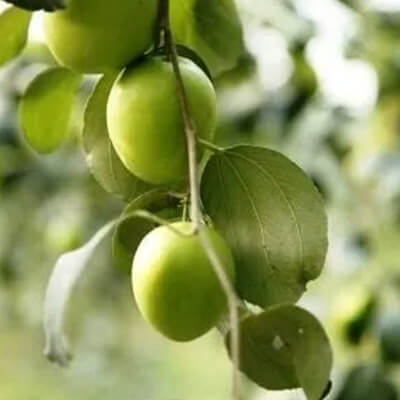
Souvira / Raja Badara (Zizyphus Sativa, Ziziphus Xylopyrus, Zizyphus Vulgaris) – Part – 2
Souvira or Raja Badara botanically known as Zizyphus vulgaris or Zizyphus xylopyra is a deciduous tree…
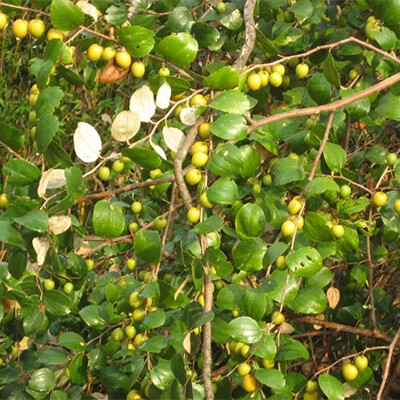
Karkandhu / Kshudra Badara (Zizyphus Nummularia) – Part – 3
Karkandhu or Z. nummularia is a type of Badara that is commonly…
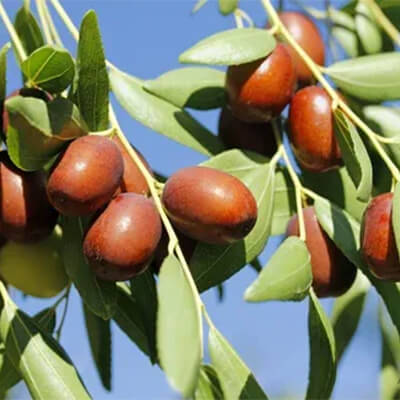
Badara / Kola (Ziziphus Jujuba, Ziziphus Mauritiana) – Part – 1
Badara is wildly and cultivated found in India and it is a…

